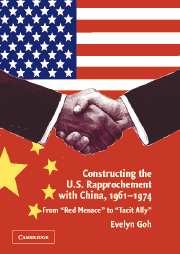Book contents
- Frontmatter
- Contents
- Foreword by Rosemary Foot
- Acknowledgments
- List of Abbreviations
- 1 Introduction
- PART I COMPETING DISCOURSES, 1961–1968
- PART II DISCURSIVE TRANSITIONS, 1969–1971
- PART III DISCOURSES OF RAPPROCHEMENT IN PRACTICE, 1971–1974
- 7 “Principled” Realist Power: Laying the Discursive Foundations of a New Relationship, July 1971 to February 1972
- 8 Principles in Practice: Policy Implications of the U.S. Decision for Rapprochement
- 9 “Selling” the Rapprochement: The Nixon Administration's Justification of the New China Policy
- 10 “Tacit Ally,” June 1972 to 1974: Consolidating or Saving the U.S.–China Rapprochement
- 11 Conclusion
- Bibliography
- Dramatis Personae
- Index
7 - “Principled” Realist Power: Laying the Discursive Foundations of a New Relationship, July 1971 to February 1972
Published online by Cambridge University Press: 27 July 2009
- Frontmatter
- Contents
- Foreword by Rosemary Foot
- Acknowledgments
- List of Abbreviations
- 1 Introduction
- PART I COMPETING DISCOURSES, 1961–1968
- PART II DISCURSIVE TRANSITIONS, 1969–1971
- PART III DISCOURSES OF RAPPROCHEMENT IN PRACTICE, 1971–1974
- 7 “Principled” Realist Power: Laying the Discursive Foundations of a New Relationship, July 1971 to February 1972
- 8 Principles in Practice: Policy Implications of the U.S. Decision for Rapprochement
- 9 “Selling” the Rapprochement: The Nixon Administration's Justification of the New China Policy
- 10 “Tacit Ally,” June 1972 to 1974: Consolidating or Saving the U.S.–China Rapprochement
- 11 Conclusion
- Bibliography
- Dramatis Personae
- Index
Summary
Kissinger: “Many visitors have come to this beautiful, and to us, mysterious land. … All have departed with new perspectives. …”
Zhou: “You will find it not mysterious. When you have become familiar with it, it will not be as mysterious as before.”
As the president's personal envoy, Henry Kissinger flew secretly to Beijing from Pakistan on 9 July 1971 and stayed for two days of talks with Zhou Enlai. Upon his return, Kissinger characterized those discussions as “the most searching, sweeping and significant … I have ever had in government.” These meetings, he reported to Nixon, marked a “major new departure in international relations,” and the Nixon administration now had the opportunity to “transform the very framework of global relationships.”
In spite of the prior back channel messages, Kissinger's first trip was in some ways a step into the unknown, and his fundamental task was to establish whether the Chinese leaders were indeed ready to relate to the United States in a nonhostile and nonmilitant fashion. Kissinger found that the small coterie of Chinese leaders he met were people whom he could deal with. More than that, he was clearly in awe of Zhou, and drawn to admiration and respect for the man whom he felt “ranks with Charles De Gaulle as the most impressive foreign statesman I have met.”
- Type
- Chapter
- Information
- Constructing the U.S. Rapprochement with China, 1961–1974From 'Red Menace' to 'Tacit Ally', pp. 153 - 183Publisher: Cambridge University PressPrint publication year: 2004



